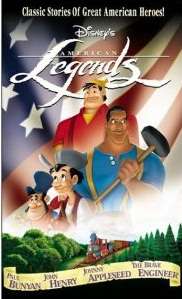Johnny Appleseed (film)
The Legend of Johnny Appleseed is an animated short musical segment from Walt Disney's 1948 film Melody Time. It is narrated by Dennis Day and is based on the American frontiersman John Chapman, better known as Johnny Appleseed.
| The Legend of Johnny Appleseed | |
|---|---|
 | |
| Directed by | Wilfred Jackson |
| Produced by | Walt Disney |
| Written by | Winston Hibler Joe Rinaldi Erdman Penner Jesse Marsh |
| Starring | Dennis Day |
| Music by | Paul J. Smith |
| Animation by | Milt Kahl Eric Larson Don Lusk Ollie Johnston Hal Ambro Harvey Toombs George Rowley (effects) |
| Layouts by | McLaren Stewart Don DaGradi Thor Putnam |
| Backgrounds by | Claude Coats Brice Mack |
| Distributed by | RKO Radio Pictures (original) Buena Vista Distribution (reissue) Walt Disney Studios Motion Pictures (current) |
Release date |
|
Running time | 17/19 minutes |
| Country | United States |
| Language | English |
Synopsis
In 1806, Pittsburgh farmer Johnny Appleseed watches as pioneers depart out west and wishes he could follow, but doesn't believe he would be able to survive in the unknown wild. Johnny is inspired by an angel to abandon his farm, go west, and plant apple seeds everywhere he goes. The angel tells Johnny that he has all that he needs to go out West: a bag of seeds to plant, a Bible, and a pot that he can use for a hat. In his travels, Johnny befriends a skunk, and thereafter, all animals instinctively trust him. As Johnny travels, he uses his pot to fry in, and sings a tune "The Lord Is Good to Me."
In the end, after walking hundreds of miles and planting apple trees all along the way, Johnny finally rests for the last time under a tree; his angel appears before him, and tells Johnny that it's time to go. Johnny gets up, scared at first upon realizing he's dead, but refuses to go to his final resting place, believing that his work is not done yet. However, the angel tells him that, where they're headed, they're low on apple trees, so Johnny picks up his seed bag and happily agrees to go with him.
The story ends with the narrator saying that the clouds in the sky aren't really clouds at all: they're apple blossoms in Johnny's heavenly orchard.
Songs
- The Lord is Good to Me
- Get on the Wagon Rolling West (Pioneers song)
- There's a Lot of Work out there to do
- Apple Feast
Cast
- Dennis Day - Narrator, The Old Settler, Johnny Appleseed, Johnny's Angel
- Dallas McKennon - Additional voices
Uncredited
- Jimmy McDoanald - Additional voices
- Bea Benaderet - Additional voices
- Pinto Colvig - Additional voices
- June Foray - Additional voices
- Mel Blanc - Additional voices
- The Rhytmaires - Vocals, Additional voices
Prior and Specific release
The film was originally a sequence in Melody Time, released May 27, 1948, and was then reissued as a stand-alone short on Christmas of 1955. It was included on the DVD releases of Disney's American Legends, on February 12, 2002; Volume 3 of Walt Disney's It's a Small World of Fun! On February 2007; and Volume 6 of Walt Disney Animation Collection: Classic Short Films on May 12, 2009.
Further reading
- Brode, Douglas (1 June 2004). From Walt to Woodstock: how Disney created the counterculture. University of Texas Press. p. 199ff. ISBN 978-0-292-70273-8. Retrieved 25 September 2011.
- Brode, Douglas (2005). Multiculturalism and the Mouse: race and sex in Disney entertainment. University of Texas Press. p. 201ff. ISBN 978-0-292-70960-7. Retrieved 24 September 2011.
- Means, Howard (12 April 2011). Johnny Appleseed: The Man, the Myth, the American Story. Simon and Schuster. p. 255ff. ISBN 978-1-4391-7825-6. Retrieved 24 September 2011.
- Pinsky, Mark I. (July 2004). The Gospel according to Disney: faith, trust, and pixie dust. Westminster John Knox Press. p. 113ff. ISBN 978-0-664-22591-9. Retrieved 24 September 2011.
- Price, Nelson (1 March 2001). Legendary Hoosiers: Famous Folks from the State of Indiana. Emmis Books. p. 4. ISBN 978-1-57860-097-7. Retrieved 24 September 2011.
- Watts, Steven (27 June 2002). The Magic Kingdom: Walt Disney and the American Way of Life. University of Missouri Press. p. 264. ISBN 978-0-8262-1379-2. Retrieved 25 September 2011.